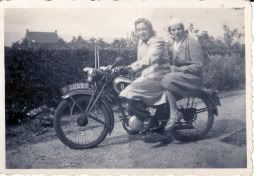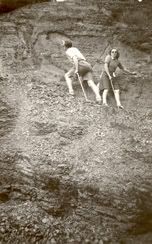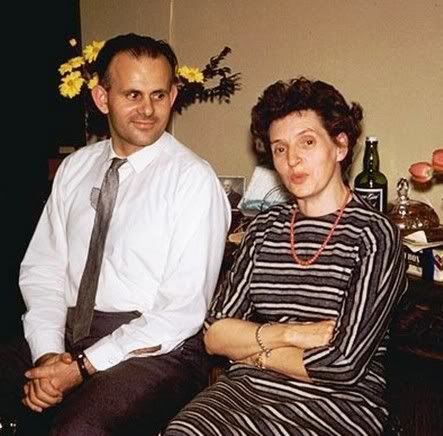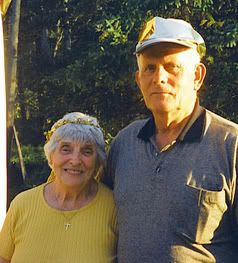opa's memoirs, part one

To understand the circumstances and situations, I have to back in time quite a bit.
It was 1937, and the depression was still at a very low point in the Netherlands. I lived in the small village of Reuver in the province of Limburg. It was so small that at age 13 I knew most of the people, so when a newcomer came you would know it immediately.
Elly's father was a military officer, but the government (just as here in Canada now) was cutting back on military expenses. With the result that he was made an inspector of the Unemployment Provisions in our area. So he and his family moved from the garrison town of Venlo to our village.
Elly was a member of the Venlo ladies lawn hockey club V.H.C. To enable her to remain a member (the distance on bicycle was a bit too far) he bought a small motorcycle for her so that she could still go to hockey practices and games. And that was quite something in our village: a girl on a motorbike. That is how I remember seeing her for the first time.
My parents had a bakery and Elly or her younger sister, Suzan, would sometimes come in the store to buy things. Over time, Elly and Suzan became friends with two of my sisters, Bert (short for Bertha) and Carla. After the war had started, Elly and/or Suzan would frequently come over to our house. After dark, and I mean dark because everything everywhere was completely blacked out, I very often had to walk them home because my mother thought that it was not safe for them to go home on foot alone. In this way, I was introduced into the Pels family. Obviously, Elly's maiden name is Pels.
We are a few years later, and something I did then had tremendous consequences for the rest of my life. It was February 1942. The Japanese invasion of the Dutch East Indies seemed unstoppable. The Dutch government, in exile in London, England, asked via "Radio London" (to which we were forbidden to listen from the German occupiers) to organize a day of prayer on Sunday March the first, the day of my eighteenth birthday. I thought I had to do something and to publicize this event I bought some orange cardboard. Orange is the colour of the Dutch Royal family, the House of Orange. At the same time, I bought rubber gloves so as not to leave any fingerprints, as well as paintbrushes and paint. I did not buy them in my hometown but in the town of Roermond, which is a 12 kilometre bike ride away. Nobody in that store knew me there so I would not have to be afraid that the Germans could trace me.
In the dark hours of the night, I stapled those signs to some of the community boards in several spots in the village. Sunday morning, all the people on their way to church saw these signs and they liked them. It was a sign that someone dared do something against the Germans. But that feeling did not last very long. Two days later, an order came from Seys Inquart (the highest German official in the Netherlands) that all the radios in the municipality were to be confiscated. I am quite sure that I would have been betrayed by someone had they known who was guilty. In the end, it was a blessing for our town because one could buy second hand radios in the surrounding towns.
A couple of weeks later, an order came that all radios in the whole country would be confiscated, and then you could not buy a second hand radio anywhere. We had of course a couple of clandestine radios hidden, to which I regularly listened. Elly's family had lost their radio and I would walk over sometimes to tell the news from Radio London whenever something major happened in the war. Elly's father, being a former military man, was very interested in that. Thus, I became a frequent visitor in Elly's house.
About a year later, Elly became serious ill with pleurisy. There were no antibiotics at the time. Elly needed extra nourishment. I had farmer friends where I could get farm-fresh milk, not the watered-down skim milk. At the time, I realized that I would find it terrible if she would die, in other words, I knew then that I loved her. Without those frequent visits, I would not have known that she was sick. This whole story hinges upon some events and circumstances dictated by the war.
November 1944
My brother, Jan, had been declared an outlaw by the Germans. In other words, there was a price on his head. As the Germans might come at night to search for him and find me, I found it better not to spend nights at home, but where would I go? I asked Elly's parents if it would be possible to stay with them. Fortunately, they agreed and I liked that very much, of course. There was some danger involved because a German civilian chemical engineer had been billeted in their house, so we had to be very careful and I had to be very quiet. The allied thrust towards Germany was progressing slowly and the British troops were less than 50 kilometres West of the River Maas (Meuse in English).
November 11, 1944
The Allies bombed the bridge over the Maas in Roermond to stop the flow of supplies to the German troops on the western side of the river. I don't know how successful they were, but in the city of Roermond, quite a few people were killed and a lot of damage was done. Among others, the house of Elly's aunt and uncle was badly damaged. They, together with their son, Joop, arrived unannounced because they assumed that Elly's parents house was not damaged. That evening, I went home to sleep. On leaving her house, I finally found the courage to give Elly a kiss, and she did not slap my face, and that was the beginning of our romance.
There was a curfew which was strictly enforced by the Germans. Anyone found on the street after 8:00p.m. could be shot on sight. The town was full of German soldiers as well as German civilians who were working on hastily built defence works. The single bell left in the church tower had struck 8 o'clock, and I still had about one kilometre to go. I was less than 100 metres from home when a German stepped forward, his gun pointed towards me and demanded to know where I was going. Because I can speak German fluently, I told him in perfect German that I belonged in that house and he let me go. No doubt, he assumed that I was a German civilian.
The Netherlands were not involved in the first world war and Remembrance Day on November 11 had no meaning then. To me, however, November 11 is Remembrance Day, because on that day, I gave my wife of more than 57 years, her first kiss. I celebrate this every year with a bouquet of freesia, similar to the first flowers I gave her when she was so sick.
The next few days I slept at home in a secret hideout that we had made. The Germans still occupied the west bank of the river. On November 17th, the first British grenades exploded in our village. Without a doubt, the church tower was the target, because the Germans used this as a lookout. Two grenades hit our house and particularly, the bakeshop was heavily damaged.
That night, I went again to Elly's house, but because there were more people in the house, I could not sleep in the same room as before and my bed was made on a landing in the attic. I had to help Elly make the bed because a mattress had to be moved. When the bed was made, I took Elly in my arms and asked her if she would marry me. Just when she said "Yes", there was a huge explosion on the other side of the river. We saw roof beams and building parts flying up high in the light of the explosion and those that followed. The Germans had blown up a centuries old castle in the town of Kessel just before they left that town.
I did not have an engagement ring to give her. . . . . but there were FIREWORKS, compliments of the Germans.
After the commotion of the explosions was over, I said to Elly that I would like our engagement to be a "clean" period. And since we were speaking in Dutch, I used the word "rein" for clean, which, when used in connection with sexuality means: "No inappropriate touching, no looking and certainly no premarital sex" Elly said that she would like that also. And then she added, "And when there will be temptations, we will help each other." And we are proud and thankful that we kept our promise to each other until our wedding day.
You can see that a certain chain of events can have tremendous results. Or is it God's hands? I believe in the last. I don't know if, without these events in the war, I would have the best wife in the world.
My Opa took a memoir writing course last year. This is one of the three pieces he wrote, the beginning of what he hopes will be a complete account of his life "for the grandchildren." I've left it more or less intact, just adding some line breaks for improved flow. I don't think I'll ever love anyone as much as he loved my Oma. I have no idea what he's going to do with himself now.



